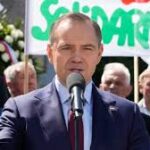[ad_1]
Jacob Rees-Mogg admits he ‘sees concerns’ of Tory MPs worried about inflation impact of Sunak’s spending
Jacob Rees-Mogg has admitted he “sees the concerns” of other Tory MPs worried about the inflationary impact of further government spending.
The Brexit opportunities minister dodged directly answering whether he was uncomfortable with the chancellor’s new support package.
But he told Sky News’ Beth Rigby Interviews…: “It’s a very difficult balancing act in an inflationary period.
“You have to get the balance right to ensure that the deficit doesn’t explode, because deficit spending during an inflationary period is deeply inflationary.”
Some Tory MPs have raised concerns the chancellor’s latest intervention is not very conservative.
Rishi Sunak announced he is imposing a windfall tax on oil and gas companies to partially fund a £15bn package to help with the cost of living.
Mr Rees-Mogg said he thinks the “underlying intention” of the announcement is “to allow things to get back to normal, to get to an equilibrium”.
But asked about colleagues’ concerns about there being an inflationary risk to the measures, he said: “I see their concerns.
“And as I say, I think this is a balancing act, that it would be foolish for me to pretend it’s easy to get right.”
Last week, the leading MP said he was against raising the “honeypot” of business with an oil and gas windfall tax.
He told Beth Rigby Interviews: “What I was saying there is that people need to understand that there is not a tax that you can take that is economically cost free.
“It doesn’t matter which tax it is, it will have an economic consequence.
“Whether it’s a pasty tax, or it’s an excess profits tax, there is an economic consequence, there isn’t a honeypot of free tax that governments can just pop into.
“So as long as they raise the tax, knowing that it will have an economic consequence, which the chancellor does, then it is a matter of choosing between one form of revenue-raising and another.
“There is no non-tax way, ultimately, of spending. It is either today’s tax, or it’s tomorrow’s tax through borrowing.”
[ad_2]
Source link








